Synology DS214play: Intel Evansport Almost Done Right
by Ganesh T S on May 20, 2014 3:00 PM ESTSingle Client Performance - iSCSI On Windows
We created a 250 GB iSCSI target and mapped it on the Windows VM. The same benchmarks were run and the results are presented below. The observations we had in the CIFS section hold true here too.
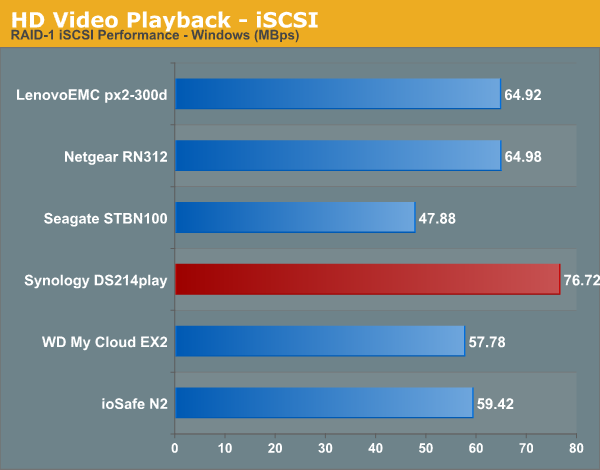
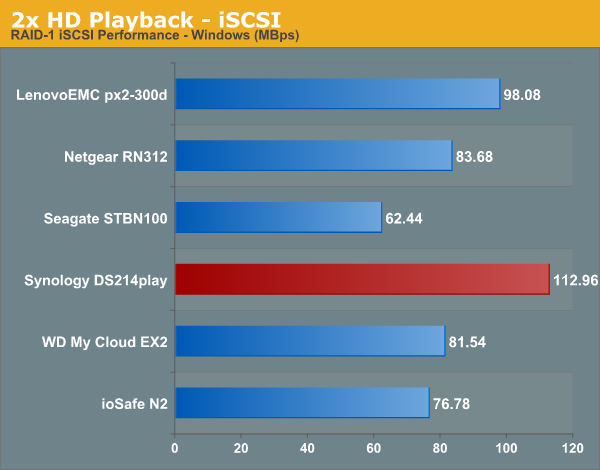
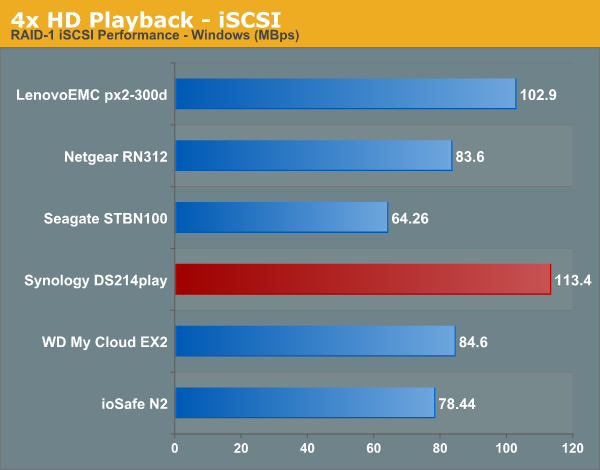
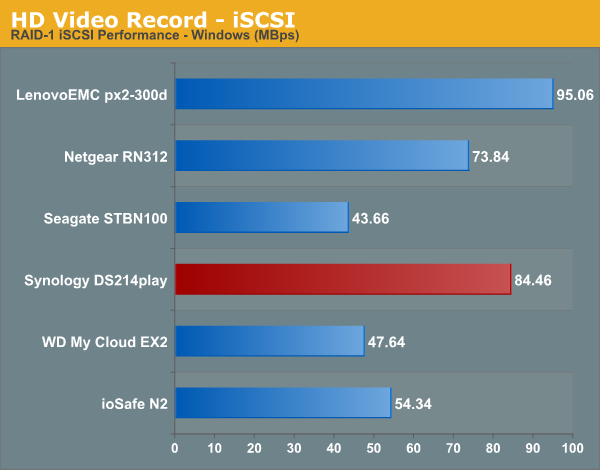
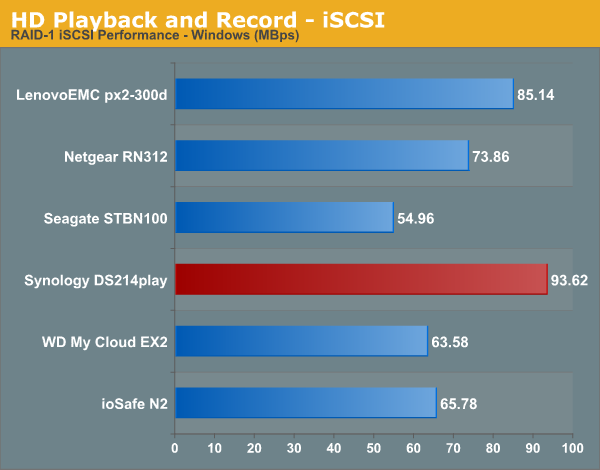


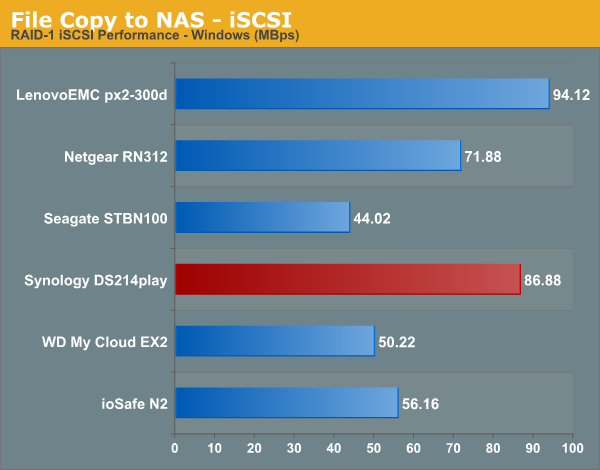
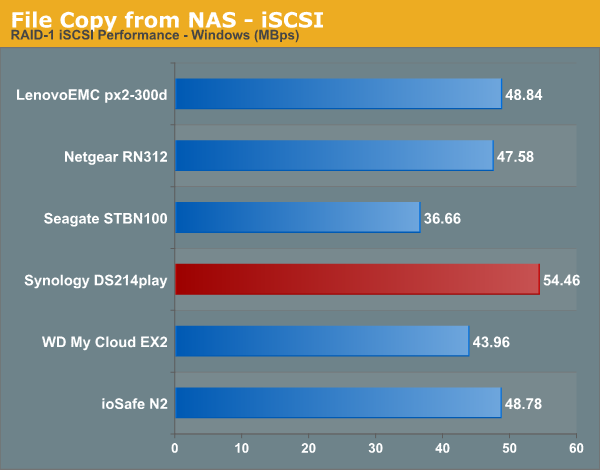
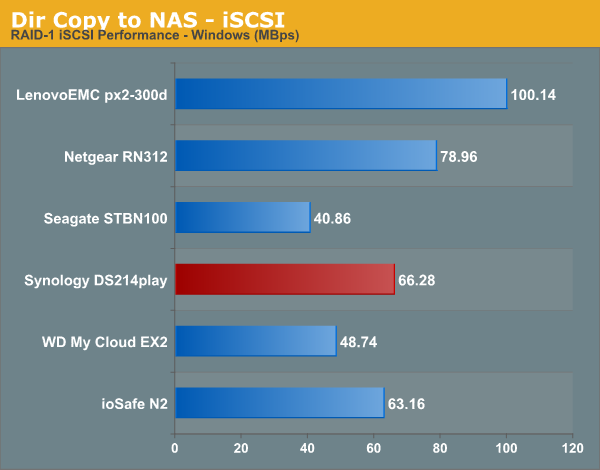
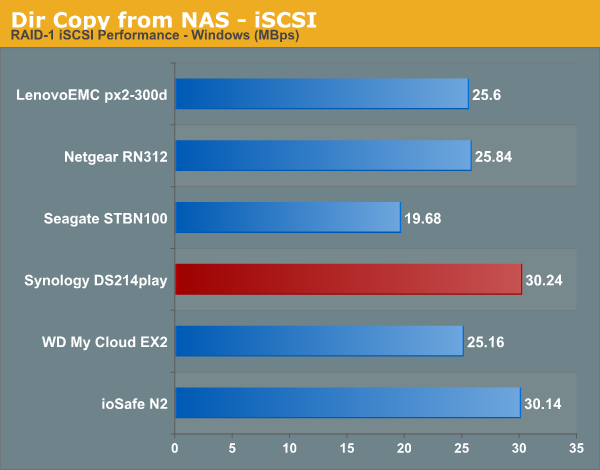
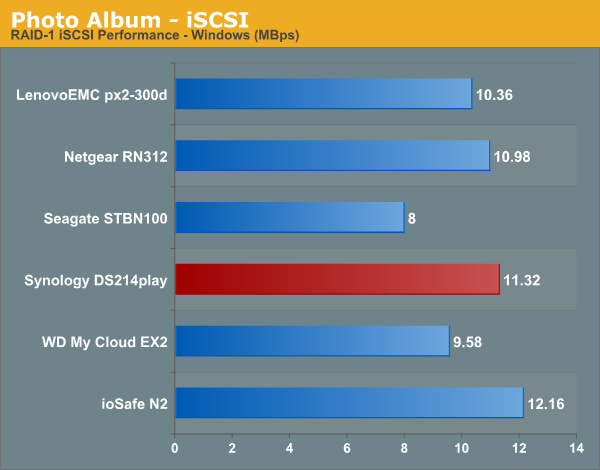
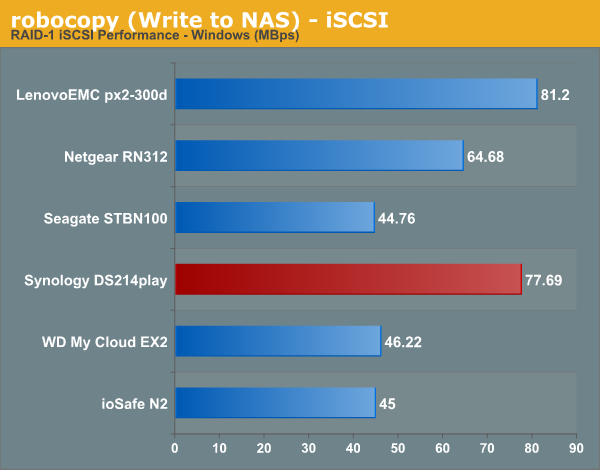
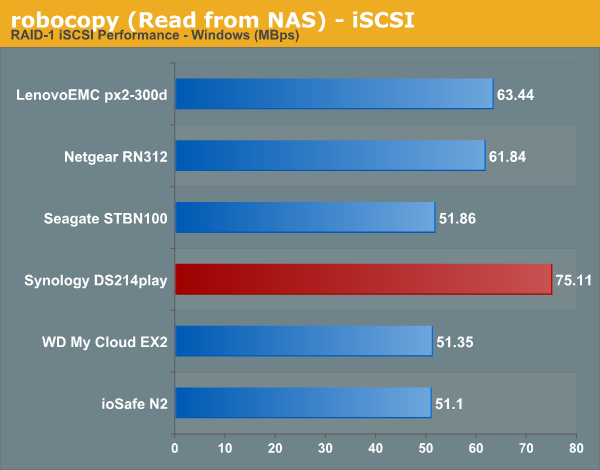
Single Client Performance - CIFS On Windows
Encryption Support Evaluation - Single Client CIFS on Windows










45 Comments
View All Comments
toonvl - Tuesday, May 20, 2014 - link
For me it's hardware RAID and RAID expansion options. FreeNAS OS can help you build a custom NAS yourself, but cannot provide RAID expansion sadly enough.That's if you want RAID 5, 6 and the likes and have the option to add/exchange disks with different capacity etc.. But if you just want RAID 1 and stick to it, then you're probably better off with a micro-ATX rig and software RAID like you suggest.ZeDestructor - Tuesday, May 20, 2014 - link
All in all, I have been completely sold on ZFS, and have no plans to use anything else for a NAS or any other form of critical storage until btrfs (a GPL-compliant and even more powerful successor to ZFS) gets a stable release. Oh, and personally I wouldn't run FreeNAS: I'd run bare FreeBSD and set it up manually.PS: A nice article from arstechnica on ZFS (and CoW FS in general): http://arstechnica.com/information-technology/2014...
ZeDestructor - Tuesday, May 20, 2014 - link
Gah... most of my comment about ZFS got nuked.... And I can't be bothered to retype in all out, so here's the tl;dr edition (read the arstechnica article I linked for more detailed info):Compared to HW RAID controllers:
- RAID5/6: ZFS has RAIDZ1/2/3, for 1, 2 or 3 disks worth of redundancy, equivalent to RAID5/6/there is no equivalent to RAIDZ3 to my knowledge
- Add/exchange disks with different capacity: Done in ZFS by swapping each disk in a vdev (ZFS term more or less equivalent to arrays), then "resilvering" once all is done to increase it's size.
Features no HW RAID controller has (to my knowledge):
- Copy-on-Write (CoW): each update to a file is written as the difference to the original file. This allows for self-healing (damaged blocks are recovered using checksums and old data to regenerate current data) and snapshots (snapshots of the FS is a a state a a point in time). Snapshots make incremental backups trivial. In fact, quite a lot of people use snapshots to back up production databases instead of doing a traditional dump the DB to disk method.
All in all, I have been completely sold on ZFS, and have no plans to use anything else for a NAS or any other form of critical storage until btrfs (a GPL-compliant and even more powerful successor to ZFS) gets a stable release. Oh, and personally I wouldn't run FreeNAS: I'd run bare FreeBSD and set it up manually.
PS: A nice article from arstechnica on ZFS (and CoW FS in general): http://arstechnica.com/information-technology/2014...
toonvl - Wednesday, May 21, 2014 - link
thanks! I'll check this out. When I have a need for a next expansion I'm probably going to use this :)JeffS - Tuesday, May 20, 2014 - link
I've been using 2-drive NAS appliances (first Netgear and then Synology) for probably 6 or 7 years now. I've got above-average technical acumen, but with two little kids and a busy job, I don't have enough hours in the day right now to worry about reliable storage. These things are small enough to sit on a bookshelf, they run quietly with low power, and a red light starts flashing and a buzzer sounds when there's a problem. About a year ago, one of the drives in my RAID-1 died. I swapped in a spare and never missed a beat. It would have been divorce court for me if our 20,000 family photos went down the drain. Yes, I still run regular backups (again, one push of a button on the front panel with an external drive plugged in), but it's a huge relief knowing that the odds are low of drive failure taking down our storage system. I never get support calls from home asking why the storage system is offline.Having said all that, I just bought a $250 Dell mini tower server, and I plan to move to it as our storage array. I'll probably keep the Synology and set up automated backup. I'm now trying to find space in the wiring closet for the Dell, and it's not an 'appliance' like these NAS units are.
Basically, the NAS took away all of the thinking with regard to redundant, networked storage, and that allowed me to stop procrastinating and get everything centralized with RAID and backup. I've got a lot of hobbies, but our primary storage array shouldn't be one of them.
We do only need about 2 TB of storage, so we're probably the ideal customer for a unit like this.
bill.rookard - Tuesday, May 20, 2014 - link
Couldn't agree more. I picked up a very nice rackable case a while back, dropped a Gigabyte mATX board in with a dual core Phenom processor, a few GB of ram, and 5 WD drives with FreeNAS. With the exception of one RMA'd drive which failed after about 6 months, it's been absolutely rock solid for about 7 years now. Total cost on the entire build, including drives (5 x 2TB drives) was right around $800 (the drives alone were $600 at the time).While I certainly do appreciate having an easy setup for this type of unit (plug, configure, play), the limitations are just too restrictive (ie: either 4TB with redundancy or 8TB without - which is simply NOT a real choice). Yes, I'm certainly an edge case when it comes to this type of thing, but looking at any 5-bay devices (which would be my personal minimum), you're easily into near four digit costs and that's NOT including a drive.
ganeshts - Tuesday, May 20, 2014 - link
I used to think like you guys till very recently. However, in addition to some of the points mentioned by other readers, there are certain aspects that only these NAS vendors provide:1. Mobile app ecosystem - Creation of a mobile app (iOS / Android) which presents an easy and intuitive interface to your NAS's contents
2. Operation of relay service to access your NAS content from an external network without port forwarding
3. Automatic backup of data from mobile devices to the NAS
4. In the case of DS214play, a hardware accelerated transcode engine behind the media server feature.
For a non-tech savvy consumer, or even for a person who knows the internal details, but doesn't want to spend time configuring or building a NAS, the units supplied by these NAS vendors make a good choice.
ZeDestructor - Tuesday, May 20, 2014 - link
I'll consider buying them when they use Copy-on-Write filesystems, and come in sizes greater than 16bays for under 6k (a fully-built backblaze pod for 45 drives comes in around the 3k mark). I value data integrity more than any convenience, and as of now (to my knowledge), a CoW FS is the best thing you can get.If you are in contact with said companies, it would be nice if you could mention that to them... anyone who has encountered bit rot knows that RAID just isn't enough these days...
jamyryals - Tuesday, May 20, 2014 - link
Couldn't agree with you more Ganesh. I have a home built set up right now on an old tower. I've been running Plex/Cloud-backups for a while now, and the fact these standalone NAS boxes have native integration with little hassle is very attractive. In the future I will be buying a solution like this.Aikouka - Tuesday, May 20, 2014 - link
Does Plex (read: Plex's modified version of FFMPEG) work with Evansport yet? Last I checked a month or so ago, it doesn't, which means you do not get hardware transcoding with this device (or any other Evansport-based NAS).